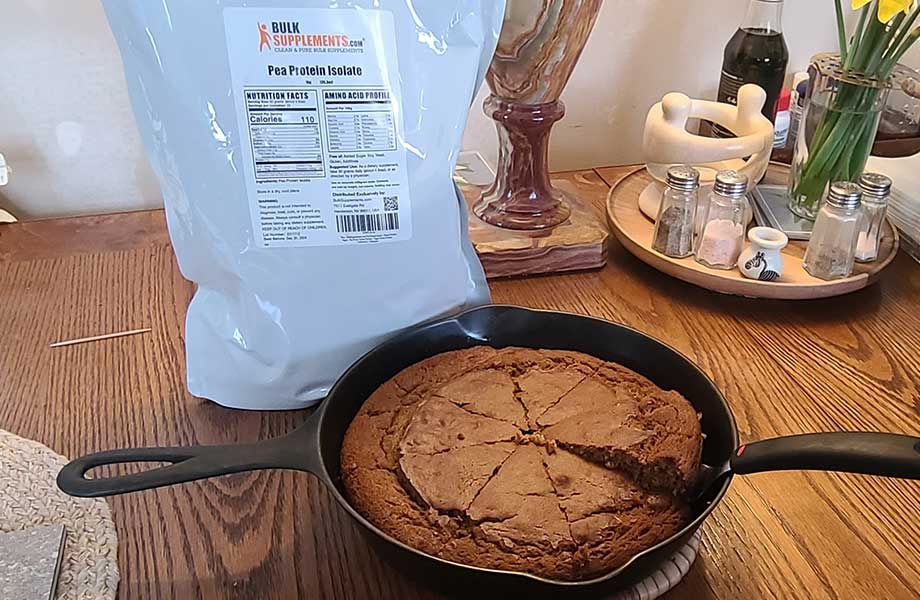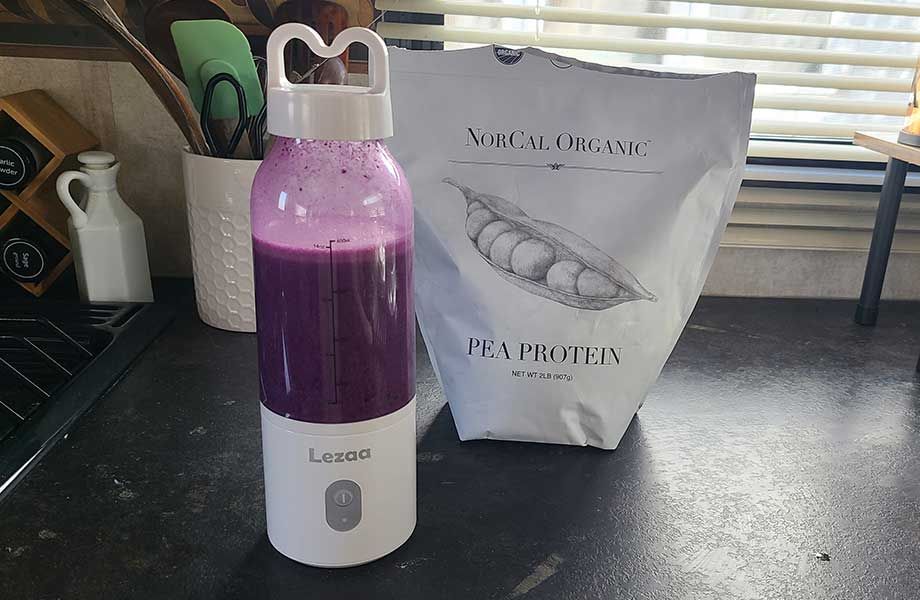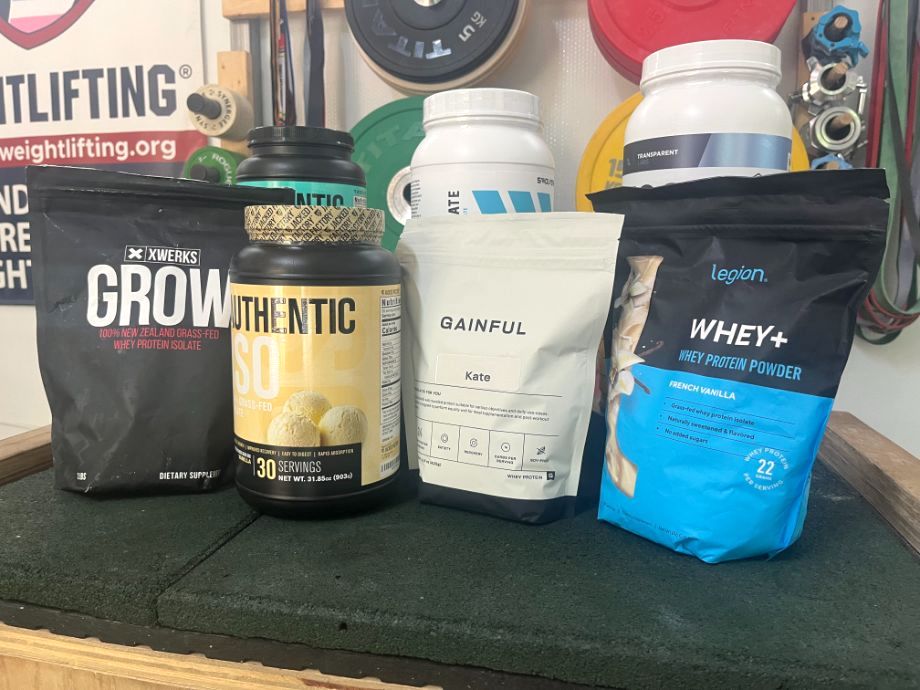We test and review fitness products based on an independent, multi-point methodology. If you use our links to purchase something, we may earn a commission. Read our disclosures.
Regardless of where you work out and whether or not you’re a professional athlete, supplementing with the best protein powder can help boost your daily protein intake, increase strength and muscle mass, and overall provide your body with the fuel it needs.
Protein¹ is one of the three macronutrients needed for performing normal daily activities. It is well-researched due its many health benefits and popularity for improving your post-workout recovery. Protein powders are a powerful resource for increasing the overall amount of protein you intake without compromising your fat and carbohydrate macronutrient intake for the day.
In this deep dive, we will explore if protein powder is good for you, discussing the differences between animal and plant-based protein powder sources, associated risks and benefits, and the different ways to integrate protein powder into your diet.
Medical disclaimer: This article is intended for educational and informational purposes only. It is not intended as a substitute for medical advice. For health advice, contact a licensed healthcare provider.
Is Protein Powder Good For You?
In a nutshell, yes, protein powder can be good for you. However, like any other aspect of nutrition and fitness, individualizing your protein powder choice to your specific needs is key. Let’s take a closer look so that you can help decide which protein source is best for you.
What is Protein Powder?
Protein powder² is an oral nutrition supplement that is derived from concentrated or isolated protein sources. These protein sources are manipulated into a fine powder that can be incorporated into your regular health and fitness routine. Protein powder is well-known for its benefits of helping your muscles recover and aid in building muscles. Many people use it for post-workout protein supplementation.

However, protein powder can also play a beneficial role as an antioxidant, enzyme supporter, hormone promoter, and intestinal bacteria regulator.² The protein found in protein powders can be from both animal sources and plant-based sources. Regardless of how you prefer your protein source to be derived, there is bound to be a protein powder that will meet your nutrition and flavor needs.
Let’s take a look at the main types of protein powder below.
Whey Protein
What is whey protein? Let us explain. Cow’s milk offers two types of protein: casein and whey.³ Of its total protein content, approximately twenty percent of cow’s milk protein is composed of whey. Whey protein is considered a complete protein of high biological value. A complete protein consists of the full amount of non-essential, branched-chain and essential amino acids, of which there are nine.
Because whey protein is complete, these amino acids are responsible for protein synthesis, helping to regulate glucose, contributing to blood pressure control, and are easily digested, especially when compared to casein protein. Whey protein is considered one of the best protein options within sports nutrition due to its ability to help build muscle, digest easily, and take rapid action on muscle mass. The best whey protein tastes good and dissolves well, too.
Types of Whey
- Concentrated whey
- Whey protein isolate
- Hydrolyzed whey protein
Casein Protein
The other 80% of the cow’s milk protein equation is casein.³ Casein is the curd byproduct of the cheese-making process, whereas whey is the liquid. When compared to whey, casein is considered a “slow” protein, due to it taking longer for the digestive system to break it down. This is due to casein protein lacking the amino acid profile that whey protein does.
RELATED: What is Casein Protein?
If you’re looking for a more functional milk protein, whey will be the better choice. However, the combination of casein and whey in protein supplements lends you the ability to experience both rapid and slow protein digestion, which may be beneficial post-workout if you want something that has a quick and lingering protein concentration for maximum recovery.
Plant-Based Protein Powder
An excellent alternative to animal-based protein powder is vegan protein powder. Plant-based protein powders come from many sources of protein, but the most notable are pea, soy, and hemp.⁴ Plant-based eating and increasing consumption of fruits and vegetables due to the many health benefits has gained attention in the past few years. As more and more people focus on healthy living and eating, the plant-based protein powder industry has exploded.
RELATED: Best Pea Protein Powder
Manufacturing protein from plants has become easier and has made creating plant-sourced protein powder more feasible. In comparison to whole plant foods, plant protein isolates are approximately 80% more concentrated with protein by weight. This has made plant-based protein mixtures possible.

While there are notable plant-based protein powder benefits, one factor to keep in mind is that in most single varieties, a complete protein profile will not be achieved. When compared to dairy protein, plant-based protein powders⁴ can lack several amino acids, or have low levels of some, and therefore may not provide you with all of the benefits found in whey protein powder. Many plant-based protein powders will feature a combination of proteins to achieve that complete and robust amino acid profile. Know that soy protein, hemp protein, and (technically) pea protein are all considered complete proteins on their own, whereas other options like rice are not.
Soy protein is derived from legumes such as soybeans, and has been associated with supporting normal growth and development throughout the lifespan. Pea-derived protein has been associated with post-workout recovery due to its high nutritional value, plus it has a low production cost. Hemp⁵ is an excellent protein source that has rapid digestibility and is becoming increasingly researched for its functional properties, however the food industry is still struggling to perfect the flavor profiling.
RELATED: Best Hemp Protein Powder
Protein Powder Benefits
Depending on the type of protein powder you purchase, you will get a variety of benefits. Most protein powders are useful for:³
- Gaining muscle
- Recovering from muscular microtears post-workout
- Improving your immune system
- Protecting against heart disease
- Improving gut health
Pay special attention to the amino acid profile prevalent in the supplement you buy. Amino acids are the building blocks of protein and each have specific functions to perform within the body. Be sure to check out our protein powder reviews to find the one that best fits your lifestyle and health goals.
Also, protein powders are considered a dietary supplement that are not FDA-regulated. Look for certifications from organizations like NSF and the Clean Label Project to make sure you’re picking a clean, safe protein supplement product.
Protein Powder Risks
Eating a well-balanced and healthy diet with fruits, vegetables, protein, whole-grains, and dairy is a preventative measure for heart disease, diabetes, kidney disease, inflammation, and much more. Consuming whole foods with the appropriate amount of macronutrients is important to living a healthy life. Protein powders can help supplement your diet to ensure you consume enough protein, but are not meant to be replacements for whole meals.
The main risks associated with protein powder are in the form of allergies or intolerances. If you have a dairy allergy³ or sensitivity, avoid whey and casein protein powders or look out for supplements that have lactase in it. Lactase aids in the enzymatic breakdown of lactose found in dairy proteins.
As soy and pea protein⁴ is incorporated more by the food industry, more reports of associated allergies are being claimed. This may be due to the increased exposure to these specific types of protein. Based on current research, hemp protein⁵ seems to have a low allergenicity. These sensitivities and allergies can lead to itching, bloating, cramping, diarrhea, nausea, and/or general discomfort. Added sugars or artificial sweeteners may also be present in the ingredient list—be sure to avoid these if you have gastrointestinal sensitivity to artificial sugars.
How to Use Protein Powder
Wondering how to use protein powder? Lucky for you, it’s fairly versatile. You can mix it with water or milk to make a protein shake for post-workout recovery, sprinkle it on top of food for added protein and calories, or even mix some with ice cream and then freeze it to create a protein-packed frozen treat.

One of the easiest ways to incorporate protein powder into your daily routine is by adding it into a smoothie mixture. By combining the best protein powder for smoothies with your favorite fruits, vegetables, and dairy (or dairy-alternative) milk, you can create a nutrient-dense smoothie that is high-protein, an excellent source of fiber, and full of vitamins and minerals.
Refer to the protein powder’s label for proper mixing instructions. Due to the different solubilities and ingredients found in these supplements, there are different instructions on how to reach a smooth blend. Most protein powders recommend a scoop of protein powder for every eight ounces of liquid.
How Do You Choose A Safe Protein Powder?
Look for products with certifications, like “third-party tested” and “cGMP,” which stands for current good manufacturing practice. You can also scrutinize the label and see the amounts of every ingredient (e.g. is there at least 20 grams of protein and minimal carbs) and if the formula includes unnecessary additives or artificial sweeteners.
We cover this and more in our guide on what to look for in protein powder.
Is Protein Powder Good For You? Final Thoughts
Protein powder is an excellent supplement promoted by registered dietitian nutritionists and other health and wellness professionals to increase overall protein intake and even support corresponding weight loss or weight gain goals. However, choosing a protein powder is a personal choice that should be individualized to the condition of your health and lifestyle goals.
Be sure to consult the nutrition label for information on calories, protein, fat, carbs, sodium, cholesterol, and ingredient list specifics. The nutrient profile of protein powders is influenced by flavoring, solubility, and macro- and micronutrient composition. Protein powder, when utilized alongside a healthy lifestyle, can be very beneficial!
Is Protein Powder Good For You? FAQs
Is it OK to have protein powder every day?
It is okay to consume protein powder every day, so long as the main source of your protein intake is coming from whole foods, and you’re ensuring you’re hitting your daily macronutrient needs.
If you’re wondering how much protein is too much, know that while it is possible to over-consume protein, which can lead to weight gain and may perpetuate underlying diseases that call for a low intake of protein daily, such as liver or kidney disease, individuals such as bodybuilders and those who participate in strength training may need to eat a high-protein diet with high-protein meals to maintain their muscle growth and level of physical activity.
Are protein powders really healthy?
It’s important to individualize your intake to meet your lifestyle wants and protein needs. The amount of grams of protein you should take in daily is specific to your body. Consuming protein powder is considered to be safe for healthy adults when healthy habits are practiced alongside its use.
What are the pros and cons of protein powder?
Protein powder is an excellent supplement for those who are recovering from physical activity, wanting to improve muscle mass, maintain body weight, and increase overall protein intake without increasing calories too much. Protein powder digestibility will vary by the person and protein source. Consuming a protein powder that does not fit well with your digestive or overall health status can lead to worsening of your condition and feeling unwell.
What are the downsides of protein powder?
Protein powder is an effective tool for incorporating additional protein into your diet to help gain muscle and improve strength. However, supplementing with protein powder that is appropriate for you is vital. Choose protein powders that do not contain your allergies or sensitivities. By using protein powder that is not agreeable with your digestive system, you may experience discomfort in the form of bloating, gas, diarrhea, and/or nausea.
Should we really take protein powder?
Whether or not you should be taking protein powder comes down to your diet and goals. Taking protein powder isn’t necessary if you’re already meeting your protein requirements with whole foods, but it’s convenient if you need that macro boost.
These statements have not been evaluated by the Food and Drug Administration. This product is not intended to diagnose, treat, cure, or prevent any diseases.
References
- Venn BJ. Macronutrients and human health for the 21st century. Nutrients. 2020;12(8):2363. doi:10.3390/nu12082363
- Ge J, Sun C-X, Corke H, et al. The health benefits, functional properties, modifications, and applications of pea (Pisum sativum L.) protein: Current status, challenges, and perspectives. Compr Rev Food Sci Food Saf. 2020;19:1835– 1876. doi: 10.1111/1541-4337.12573
- Fadam B, Ambadkar R, Rathod K, et al. Health benefits of whey – a brief review. Int J Livest Res. 2018;8(5):31-49. doi: 10.5455/ijlr.20170411022323
- Hertzler SR, Lieblein-Boff JC, Weiler M, et al. Plant proteins: Assessing their nutritional quality and effects on health and physical function. Nutrients. 2020;12(12):3704. doi: 10.3390/nu12123704
- Shen P, Gao Z, Fang B, et al. Ferreting out the secrets of industrial hemp protein as emerging functional food ingredients.Trends Food Sci Technol. 2021;112:1-15. doi: 10.1016/j.tifs.2021.03.022
Further reading

In this Bowflex TC1000 TreadClimber review, I’ll go into detail about what I really think about this wacky cardio machine. Read more

Looking for an alternative exercise to build lower body muscle while improving your cardio? The training experts at GGR break down the sled push workout. Read more

In our REP Fitness Athena review, we take a first look at this newly released plate-loaded or selectorized functional trainer. Read more

Looking for some guidance in your fitness app? Check out our picks for the best online personal trainers on the market. Read more

